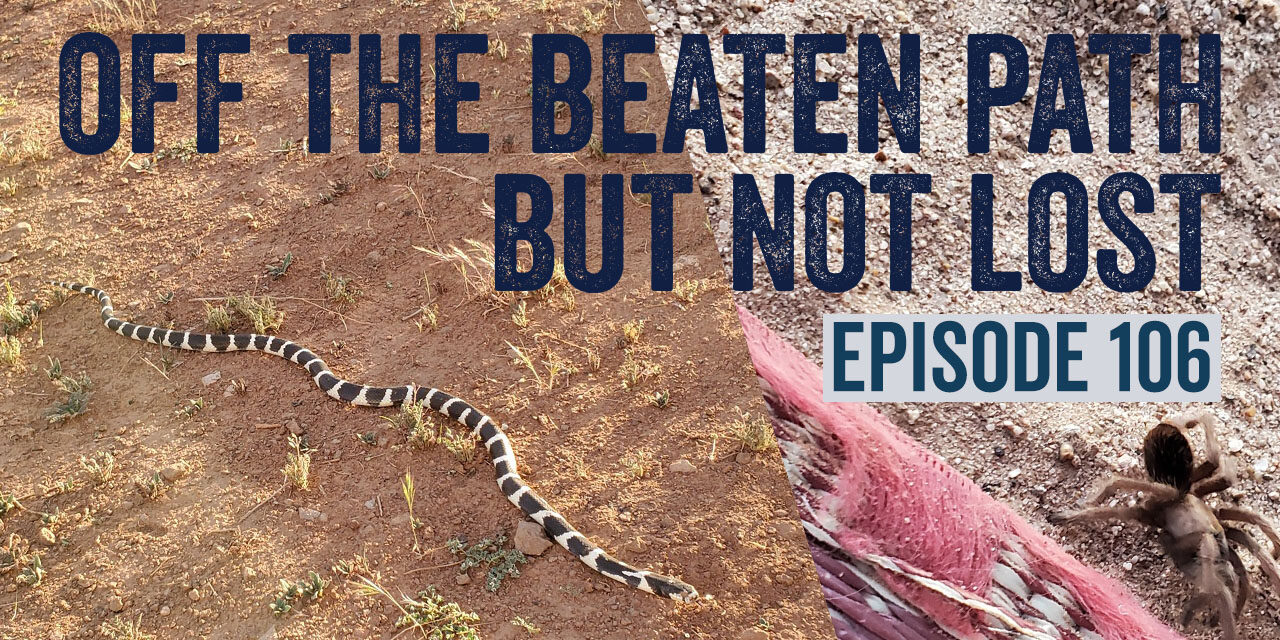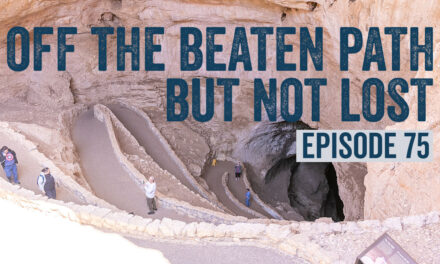Pest management is a crucial aspect of RV living, ensuring comfort and safety on the road. In this episode, we're diving into our encounters with uninvited guests, from moths in South Dakota to persistent ladybugs during the Beet Harvest in North Dakota and even a surprise mouse in the Valley of the Gods. We'll explore practical strategies to keep bugs out of your RV, ensuring those tiny intruders stay outside where they belong. Additionally, we'll tackle the challenge of how to keep rodents out of your RV and safeguard your space from larger pests. Join us as we share practical prevention tips and our comprehensive RV pest-proofing checklist, designed to help you enjoy a pest-free journey wherever you roam.
Looking for something specific? 👇
Listen to the podcast
Hey adventurers! 🚐
Did this episode spark some wanderlust, or did it remind you of one of your own off-the-beaten-path stories? If you felt that campfire friendship while listening, we would be super grateful if you’d take a moment to pop over to Apple Podcasts. Please leave us a rating, maybe say hi in the review section, and don’t forget to subscribe. It’s like giving a friendly nod to a fellow RVer on the open road.
Do you have a hidden gem of a location you think we should explore next? Or maybe a practical tip for full-time RV living? Leave us a message—this journey is all the richer when shared with the community.
🏞️ Safe travels, and see you down the road!
SUBSCRIBE: APPLE PODCASTS | PODBEAN | SPOTIFY | IHEART RADIO | PANDORA | TUNEIN | Plus, almost all podcasting apps. Let us know if you can't find us on your app.
Pest management is crucial
While traveling by RV, one aspect that often goes unnoticed until it's a problem is pest management. The presence of pests like rodents and insects in your RV isn't just a nuisance; it's a matter of health and safety. These tiny invaders can carry diseases and trigger allergies, turning your dream journey into a less-than-pleasant experience. It's crucial to keep bugs out of your RV and ensure a healthy environment for you and your family while on the road.
Implementing measures to keep rodents out of your RV is also essential. Beyond health concerns, pests pose a significant threat to your RV, which can be a substantial investment. Rodents, in particular, are notorious for causing damage to RVs. They tend to chew through vital components such as wiring, insulation, and interior structures. This kind of damage can lead to costly repairs and, in some cases, irreversible damage.
The presence of pests directly impacts the comfort and quality of life in your RV. Pests like ants and mice can contaminate food supplies, leading to waste and additional expenses. The ladybugs we picked up in North Dakota have become an enormous nuisance. We're still dealing with them three months later!
Effective pest management in an RV is essential for maintaining health and safety, protecting your investment, ensuring comfort and quality of life, and safeguarding your food supplies. Addressing these concerns proactively is key. Adopting strategies to keep bugs and rodents out of your RV can significantly enhance your living experience. It lets you focus on the joys of travel and adventure without unnecessary distractions.
Practical solutions to keep bugs and rodents out of your RV
Living in an RV brings a unique set of challenges compared to a traditional home, especially when it comes to pest control. The confined space of an RV makes it more susceptible to rapid pest infestations. In such a compact environment, what starts as a small problem can quickly escalate into a major infestation. This is why it's crucial to be vigilant and proactive in implementing strategies to keep rodents and bugs out of your RV.
The mobility of RV life also plays a significant role in pest management. Traveling to different locations exposes your RV to various types of pests, some of which might not be common in a stationary home. Each new environment can introduce new challenges, from mosquitoes in wet areas to ants in wooded campsites. This constant change requires RVers to be adaptable and knowledgeable about local pest risks.
Another factor is the outdoor exposure inherent in RV living. RVs are often parked in natural settings, which, while beautiful, increase exposure to outdoor pests like mosquitoes, ants, and mice. Balancing the desire to be close to nature with the need to keep nature out of your living space is a constant challenge. Sealing up your RV as best you can is important to keep rodents and bugs out.
Speaking of sealing, you should ensure that the seals on your slides are all working and not stuck open. The ventilation systems in RVs are another potential entry point for pests. These systems are essential for air circulation but allow pests to enter if improperly maintained. Regular checks and maintenance of these systems are necessary to prevent pest entry while ensuring proper ventilation.
Lastly, food storage in an RV presents its own set of challenges. The limited space means that even small amounts of exposed food can attract pests. Effective food storage solutions are crucial in an RV setting. Using airtight containers and ensuring no food is left out are simple yet effective ways to deter pests.
What are your favorite prevention strategies or products? Click the button above or email us ([email protected]) with your stories. We would love to play your stories on the podcast, but let us know if you don't want to share.
We did see that the Irish Spring trick might not be the best option. 👇
Safe and non-toxic ways to remove pests from your RV
When removing pests from your RV, you should start by identifying the type of pest you're dealing with. This initial step is important as it determines the most effective removal method. For instance, the approach to keep bugs out of your RV will differ from the strategy to keep rodents out of your RV.
For natural and non-toxic solutions, several options are available. Diatomaceous Earth is highly effective for ants, cockroaches, and other small insects. Sprinkle it around areas where you have seen the bugs or around your tires and jacks on the outside. Essential oils such as peppermint, eucalyptus, and citronella can also deter various pests, including spiders and mosquitoes. These are great options for those who prefer environmentally friendly solutions. Mixing water and vinegar can deter ants and other insects and help clean surfaces.
When dealing with rodents, mouse traps are a go-to solution. You can use snap traps or humane traps, baiting them with peanut butter or cheese, to keep rodents out of your RV. For ants, place ant baits in areas where they are seen, but ensure these are out of reach of pets and children. Fly traps are excellent for managing flies and other flying insects.
An essential part of pest removal is ensuring they don't return. After removing pests, it's important to seal all potential entry points. This could involve checking and repairing seals around windows, doors, and other openings. Regular RV cleaning and maintenance are vital to preventing future infestations. A clean environment is less likely to attract pests back into your space.
When traveling with pets and children, always opt for non-toxic options and ensure that traps and baits are placed in areas where pets and children can't access them.
In cases of severe infestations, it might be necessary to seek professional help. Professional pest control services can offer solutions for large or difficult-to-manage infestations, providing peace of mind and ensuring your RV remains a safe and comfortable travel space.
RV Pest-Proofing Checklist
We compiled a handy checklist to help keep bugs and rodents out of your RV.
1. Initial inspection and maintenance
- Inspect windows, doors, vents, and external cable entries. Seal any gaps or holes.
- Look for openings where pipes and wires enter. Seal the gaps with appropriate materials.
- Ensure all roof vents and seams are sealed and intact.
2. Travel Days
- Vacuum and wipe down all surfaces to remove crumbs and residue.
- Ensure areas like the bathroom and kitchen are dry to avoid attracting pests.
- Store food in airtight containers and avoid leaving any open packages.
3. When you arrive at the new location
- Check for anthills, rodent burrows, or insect nests around the parking spot.
- Use screens on windows and doors when they are open. Some people like to add a string of lights around their RV to help keep pests away.
- Consider natural repellents like peppermint oil for mice or citronella for mosquitoes.
4. Regular maintenance
- Keep the interior clean, especially the kitchen area.
- Monthly check seals, undercarriage, and roof for any new gaps or damage.
- Regularly dispose of garbage and keep the waste area clean.
5. Storing your RV
- Before long-term storage, clean the RV thoroughly.
- Close all vents, windows, and external openings.
- Prevent dampness, which can attract pests. Use something like Damprid.
6. Pet considerations
- Store pet food in sealed containers.
- Keep pets groomed to avoid attracting pests like fleas or ticks.
7. Chemical and natural treatments
- If necessary, use pesticides that are safe for enclosed spaces.
- Explore diatomaceous earth, essential oils, or other natural solutions.






